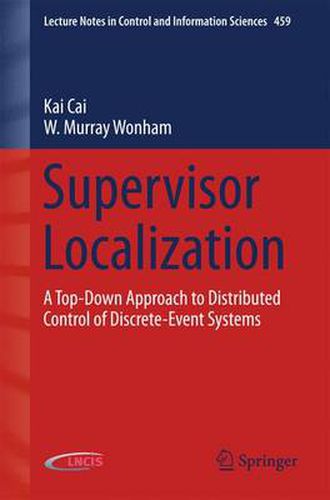Readings Newsletter
Become a Readings Member to make your shopping experience even easier.
Sign in or sign up for free!
You’re not far away from qualifying for FREE standard shipping within Australia
You’ve qualified for FREE standard shipping within Australia
The cart is loading…






This title is printed to order. This book may have been self-published. If so, we cannot guarantee the quality of the content. In the main most books will have gone through the editing process however some may not. We therefore suggest that you be aware of this before ordering this book. If in doubt check either the author or publisher’s details as we are unable to accept any returns unless they are faulty. Please contact us if you have any questions.
This monograph presents a systematic top-down approach to distributed control synthesis of discrete-event systems (DES). The approach is called supervisor localization; its essence is the allocation of external supervisory control action to individual component agents as their internal control strategies. The procedure is: first synthesize a monolithic supervisor, to achieve globally optimal and nonblocking controlled behavior, then decompose the monolithic supervisor into local controllers, one for each agent. The collective behavior of the resulting local controllers is identical to that achieved by the monolithic supervisor.
The basic localization theory is first presented in the Ramadge-Wonham language-based supervisory control framework, then demonstrated with distributed control examples of multi-robot formations, manufacturing systems, and distributed algorithms. An architectural approach is adopted to apply localization to large-scale DES; this yields a heterarchical localization procedure, which is also demonstrated with benchmark examples. Moreover, a state-based framework, state-tree structures, is exploited for efficient computation of localization. Finally localization is extended to timed DES, which addresses distributed control synthesis with temporal specifications. The authors’ TCT software and sourcecode will help the reader to reproduce the results demonstrated in the examples.
Academic researchers and graduate students interested in discrete-event and distributed systems and control will find this book an instructive resource. It will also be useful for researchers in manufacturing, supply-chain and logistics and practitioners in related industries.
$9.00 standard shipping within Australia
FREE standard shipping within Australia for orders over $100.00
Express & International shipping calculated at checkout
This title is printed to order. This book may have been self-published. If so, we cannot guarantee the quality of the content. In the main most books will have gone through the editing process however some may not. We therefore suggest that you be aware of this before ordering this book. If in doubt check either the author or publisher’s details as we are unable to accept any returns unless they are faulty. Please contact us if you have any questions.
This monograph presents a systematic top-down approach to distributed control synthesis of discrete-event systems (DES). The approach is called supervisor localization; its essence is the allocation of external supervisory control action to individual component agents as their internal control strategies. The procedure is: first synthesize a monolithic supervisor, to achieve globally optimal and nonblocking controlled behavior, then decompose the monolithic supervisor into local controllers, one for each agent. The collective behavior of the resulting local controllers is identical to that achieved by the monolithic supervisor.
The basic localization theory is first presented in the Ramadge-Wonham language-based supervisory control framework, then demonstrated with distributed control examples of multi-robot formations, manufacturing systems, and distributed algorithms. An architectural approach is adopted to apply localization to large-scale DES; this yields a heterarchical localization procedure, which is also demonstrated with benchmark examples. Moreover, a state-based framework, state-tree structures, is exploited for efficient computation of localization. Finally localization is extended to timed DES, which addresses distributed control synthesis with temporal specifications. The authors’ TCT software and sourcecode will help the reader to reproduce the results demonstrated in the examples.
Academic researchers and graduate students interested in discrete-event and distributed systems and control will find this book an instructive resource. It will also be useful for researchers in manufacturing, supply-chain and logistics and practitioners in related industries.